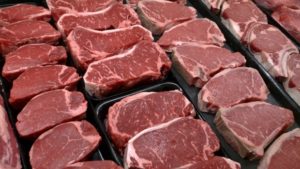Some groups want to see animal products taxed similarly to tobacco, sugar, and carbon

The steep climb in global meat consumption has environmental interest groups debating a “sin” tax on animal products.
Meat consumption grew by more than five times between 1992 and 2016 and has contributed to greenhouse gas emissions, global obesity, rising rates of diabetes and cancer, soil degradation and deforestation, according to the Farm Animal Investment Risk & Return (FAIRR) Initiative.
The British activist group argues meat should join products like tobacco, sugar and carbon, which are often taxed because they are harmful to people’s health and the environment.
“We’ve seen an increasing trend toward intervention, especially in Europe, this idea of looking at sin taxes,” said Lauren Compere, managing director at Boston Common Asset Management, an environmentally minded investment group. She listed Denmark, Sweden and Germany as countries considering legislation toward a meat tax.
Part of the solution
Compere told CBC’s B.C. Almanac host Michelle Eliot that such a tax is part of a group of incentives that could to address the problems associated with increased meat production.
“Even marginally decreasing the consumption of meat increases health cost savings and also reduces environmental degradation,” she said.
A similar tax imposed on sugar in Mexico generated revenue that was used to install drinking fountains and accessible clean water in depressed and lower-income neighbourhoods, Compere said. That, in turn, reduced the amount of sugar these residents consumed because they were no longer drinking as much soda or juice.
Revenue generated by a meat tax could be spent on improving consumer education on nutrition and plant-based diets, which could also help reduce meat consumption, Compere said.
More people, more food
But Kevin Boon, general manager of the B.C. Cattlemen’s Association in Kamloops, isn’t convinced that the money from a meat tax would go toward changing the industry. He said that pointing the finger at one commodity is too narrow a view.
He argues that the world’s expanding population is creating more demand for food, including meat.
“If we’ve got to produce more food for more humans, we’re going to need more animals, more plants, more everything else to do it.”
“To put a tax on a food product of any kind that is recognized in the Canadian Health Guide as an essential part of a balanced diet, then we need to really take a very close look at what we’re doing,” he said.
Compere argues that production needs to be matched with consumer needs — and she sees increasing trends toward veganism along with global demands for sustainable practices.
“Understanding the sustainable practices, where it’s produced, how it’s produced and by whom, is actually becoming pretty standard in terms of consumers wanting to know where their food is produced,” she said.


